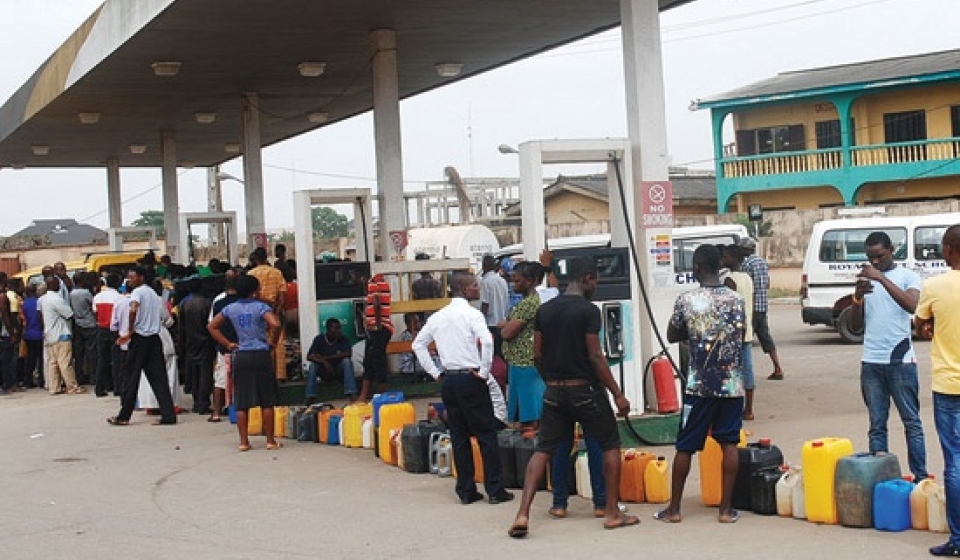The scarcity of petrol continued on Sunday in many cities across the country, as hundreds of motorists thronged the few filling stations that dispensed the product.
This is coming as the Department of Petroleum Resources announced that it had constituted special intelligence monitoring teams nationwide to ensure prompt delivery of the product to designated filling stations.
The House of Representatives Committee on Petroleum Resources (Downstream), however, said it could not intervene until its resumption from break on April 12.
The queues at filling stations in Lagos and other parts of the country grew longer despite the petrol cargos that the Nigerian National Petroleum Corporation claimed were discharged on Friday.
For instance, many stations on the Ketu-Ikorodu road in Lagos did not sell the product on Sunday, while the few selling were besieged by desperate motorists.
Some filling stations in Lagos and Ogun states sold a litre of petrol for between N100 and N140, which was above the approved prices of N65 and N65.50 for independent/major marketers and the NNPC stations, respectively.
Many motorists and other consumers had to resort to the black market, where the product was being sold for as much as N200 per litre in some places.
The scarcity and the hike in prices resulted in astronomical rise in fares charged by commercial transport operators.
In Abuja, Nasarawa and Kaduna, petrol queues were noticed at many filling stations. For instance, the queues formed in front of the largest NNPC mega station on the Kubwa-Zuba Expressway on Sunday were massive and stretched several kilometres.
Major filling stations such as Total, Conoil, Nipco, and Forte Oil that dispensed petrol had long queues, as motorists spent several hours waiting to be served.
But some filling stations in remote locations in Abuja dispensed the product at rates far higher than the official pump prices.
For instance, one petrol station along Byazhim Road in Kubwa, a popular satellite town in Abuja, sold the product at N150 per litre. And it was gathered that the outlet had been dispensing the commodity for that price since Friday.
Another petrol station in Apo, Abuja, also dispensed petrol at N140 per litre, but it still had long queues of motorists and other petrol seekers.
The DPR explained the functions of the newly constituted intelligence monitoring teams in a statement from its Abuja zonal office. It said, “The teams would enforce the government approved price regime and ensure the right quantity and quality of products is dispensed.
“Consequently, the department hereby directs all depots with petroleum products to truck out to designated filling stations as programmed while all filling stations in strategic locations shall continue to operate 24 hours during the Easter holidays.”
The DPR stated that the N2m sanction against depots selling products above the regulated price and the N100,000 fine per dispensing pump for filling stations found to be selling above approved rates were still in force.
It said, “Any marketer found to be hoarding will have the products dispensed free to the public and diversion of products will attract a penalty of N200/litre. In addition, the operating licences of offenders will be suspended for a minimum of three months or may be revoked outright, depending on the magnitude of the offence.”
The National Operation Controller, Independent Petroleum Marketers Association of Nigeria, Mr. Mike Osatuyi, told one of our correspondents that the supply to members of the association had not improved, adding that marketers should be given access to foreign exchange to import fuel.
He said, “Give genuine marketers who know the job and who have the facilities foreign exchange, and the country will be wet with products. They said they want to operate a monopoly and it has failed. It is very unfortunate that we are experiencing this again.”
The NNPC said on Friday that a cargo containing 42 million litres of petrol had completely discharged as of 4pm, adding that two more cargos with a total of 44 million litres were discharging, while another cargo containing 44 million litres had berthed and waiting to discharge.
Meanwhile, the House of Representatives Committee on Petroleum Resources (Downstream) said that there was little it could do to arrest the biting fuel scarcity in the country.
The Chairman of the committee, Mr. Joseph Akinlaja, told The PUNCH that members were already out of Abuja and would reconvene on April 12.
“We are on break till April 12. We cannot attend to that matter until the House resumes. Everybody is away now. It is when we resume that we can begin to see what can be done,” he said.
The fuel situation worsened following last Wednesday’s comment by the Minister of State for Petroleum Resources, Dr. Ibe Kachikwu, that he was not a magician and could not do anything overnight to halt the scarcity.
He said the scarcity was likely to linger up until May, a comment that frightened Nigerians and led to panic-buying of petrol with the attendant extended queues at filling stations.

 Forex3 weeks ago
Forex3 weeks ago


 Naira2 weeks ago
Naira2 weeks ago
 Billionaire Watch2 weeks ago
Billionaire Watch2 weeks ago




 Naira2 weeks ago
Naira2 weeks ago




 Naira2 weeks ago
Naira2 weeks ago




 Naira1 week ago
Naira1 week ago




 Naira4 weeks ago
Naira4 weeks ago




 Naira3 weeks ago
Naira3 weeks ago






















